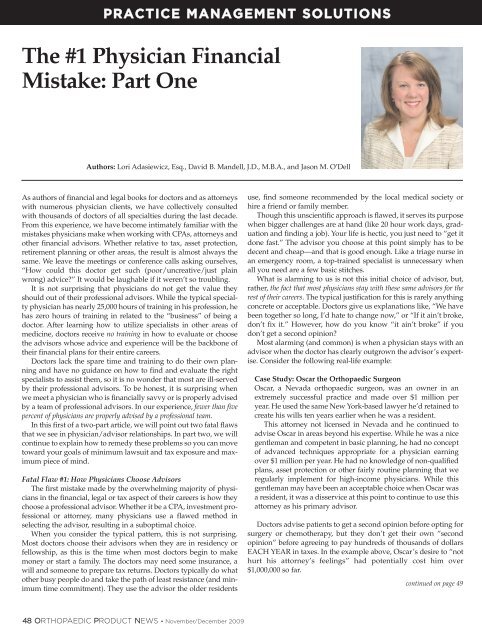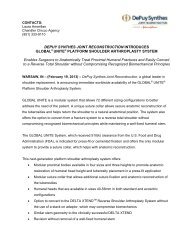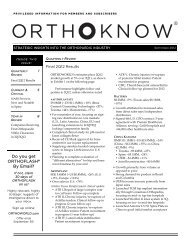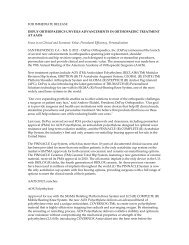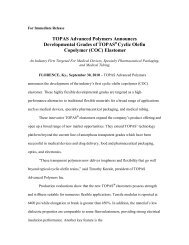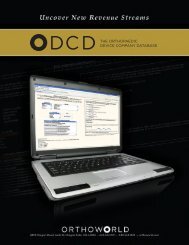Hip & Knee Surgery - Orthoworld
Hip & Knee Surgery - Orthoworld
Hip & Knee Surgery - Orthoworld
You also want an ePaper? Increase the reach of your titles
YUMPU automatically turns print PDFs into web optimized ePapers that Google loves.
PRACTICE MANAGEMENT SOLUTIONSThe #1 Physician FinancialMistake: Part OneAuthors: Lori Adasiewicz, Esq., David B. Mandell, J.D., M.B.A., and Jason M. O’DellAs authors of financial and legal books for doctors and as attorneyswith numerous physician clients, we have collectively consultedwith thousands of doctors of all specialties during the last decade.From this experience, we have become intimately familiar with themistakes physicians make when working with CPAs, attorneys andother financial advisors. Whether relative to tax, asset protection,retirement planning or other areas, the result is almost always thesame. We leave the meetings or conference calls asking ourselves,“How could this doctor get such (poor/uncreative/just plainwrong) advice?” It would be laughable if it weren’t so troubling.It is not surprising that physicians do not get the value theyshould out of their professional advisors. While the typical specialtyphysician has nearly 25,000 hours of training in his profession, hehas zero hours of training in related to the “business” of being adoctor. After learning how to utilize specialists in other areas ofmedicine, doctors receive no training in how to evaluate or choosethe advisors whose advice and experience will be the backbone oftheir financial plans for their entire careers.Doctors lack the spare time and training to do their own planningand have no guidance on how to find and evaluate the rightspecialists to assist them, so it is no wonder that most are ill-servedby their professional advisors. To be honest, it is surprising whenwe meet a physician who is financially savvy or is properly advisedby a team of professional advisors. In our experience, fewer than fivepercent of physicians are properly advised by a professional team.In this first of a two-part article, we will point out two fatal flawsthat we see in physician/advisor relationships. In part two, we willcontinue to explain how to remedy these problems so you can movetoward your goals of minimum lawsuit and tax exposure and maximumpiece of mind.Fatal Flaw #1: How Physicians Choose AdvisorsThe first mistake made by the overwhelming majority of physiciansin the financial, legal or tax aspect of their careers is how theychoose a professional advisor. Whether it be a CPA, investment professionalor attorney, many physicians use a flawed method inselecting the advisor, resulting in a suboptimal choice.When you consider the typical pattern, this is not surprising.Most doctors choose their advisors when they are in residency orfellowship, as this is the time when most doctors begin to makemoney or start a family. The doctors may need some insurance, awill and someone to prepare tax returns. Doctors typically do whatother busy people do and take the path of least resistance (and minimumtime commitment). They use the advisor the older residentsuse, find someone recommended by the local medical society orhire a friend or family member.Though this unscientific approach is flawed, it serves its purposewhen bigger challenges are at hand (like 20 hour work days, graduationand finding a job). Your life is hectic, you just need to “get itdone fast.” The advisor you choose at this point simply has to bedecent and cheap—and that is good enough. Like a triage nurse inan emergency room, a top-trained specialist is unnecessary whenall you need are a few basic stitches.What is alarming to us is not this initial choice of advisor, but,rather, the fact that most physicians stay with these same advisors for therest of their careers. The typical justification for this is rarely anythingconcrete or acceptable. Doctors give us explanations like, “We havebeen together so long, I’d hate to change now,” or “If it ain’t broke,don’t fix it.” However, how do you know “it ain’t broke” if youdon’t get a second opinion?Most alarming (and common) is when a physician stays with anadvisor when the doctor has clearly outgrown the advisor’s expertise.Consider the following real-life example:Case Study: Oscar the Orthopaedic SurgeonOscar, a Nevada orthopaedic surgeon, was an owner in anextremely successful practice and made over $1 million peryear. He used the same New York-based lawyer he’d retained tocreate his wills ten years earlier when he was a resident.This attorney not licensed in Nevada and he continued toadvise Oscar in areas beyond his expertise. While he was a nicegentleman and competent in basic planning, he had no conceptof advanced techniques appropriate for a physician earningover $1 million per year. He had no knowledge of non-qualifiedplans, asset protection or other fairly routine planning that weregularly implement for high-income physicians. While thisgentleman may have been an acceptable choice when Oscar wasa resident, it was a disservice at this point to continue to use thisattorney as his primary advisor.Doctors advise patients to get a second opinion before opting forsurgery or chemotherapy, but they don’t get their own “secondopinion” before agreeing to pay hundreds of thousands of dollarsEACH YEAR in taxes. In the example above, Oscar’s desire to “nothurt his attorney’s feelings” had potentially cost him over$1,000,000 so far.continued on page 4948 ORTHOPAEDIC PRODUCT NEWS • November/December 2009


